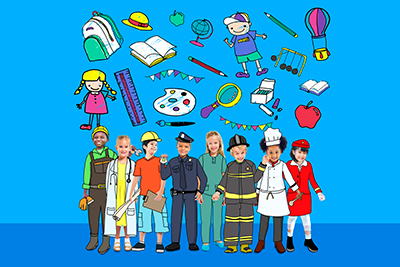Toys provide your child with entertainment, stimulation and inspiration. However, educational toys also assist your child’s development – and may help their schooling. Here’s how.
Toys come in all shapes and sizes; from sophisticated technological gadgets to basic building blocks. While most are primarily designed to provide entertainment to your child, there are some toys that are specifically designed to support their education – and may even help with development.

How Do Toys Help Your Child To Develop?
Of course, there are thousands of different toys on the market, and each has its own set of unique attributes – which can make selecting the right one rather tricky! Here’s how educational toys can help with your child’s development.
- Gross Motor Skills – Toys that encourage your child to balance, coordinate movement or develop muscular strength help to develop gross motor skills. Gaining mastery and control of movement is a valuable skill, which can prove useful in sports, performing arts, and other physical activities.
Suitable Toys: Bicycles, trampolines, jungle gyms, skipping ropes, hoops. - Fine Motor Skills – This refers to the skills required for fine movement, such as writing, sewing, and picking up small items with the fingers. Selecting toys that develop fine motor skills give your child a head-start at school, as they’ll have better pen-control and be able to sustain grip for longer.
Suitable Toys:: Building blocks, pencils and crayons, toys that involve placement of pegs or shapes. - Scientific Thinking – Scientific toys encourage experimentation and inquisitive thinking; in addition to teaching children about the world around them. This type of thinking promotes creativity as well as critical thinking skills, and becomes part of their neurological wiring, shaping how they think and act. Over time, this helps your child to become a more effective learner. Introduce these toys at an early age to develop interest in the process of scientific thinking and rationalization.
Suitable Toys: Magnifying glasses, ant factories, science kits, microscopes, telescopes, mineral / fossil collections. - Mathematical Skills – Give your child a head-start in math by providing them with toys that develop skills in counting, subtracting and estimating, as well as helping them understand the value of numbers. Use engaging toys that build on their natural curiosity; such as shape-sorters, counting / sorting games, or games that encourage them to pour, measure, fill and stir.
Suitable Toys: An abacus, counting beads, dominoes, role-play shop (with money), magnetic numbers. - Literacy – At school, literacy will be a big priority, and certain toys will help your child to gain familiarity with reading, writing and comprehension. It’s important to understand that, in order to read or write, your child first needs to learn about sounds, words, language and of course, story-telling! Read to your child and help them to sound out letters. Singing is also a valuable activity that encourages your child to think about different sounds in words. These interactions prepare your child for talking and socializing, in addition to getting them used to the process of reading and writing. They also assist with comprehension.
Suitable Toys: Flash cards, word games, books, phonics-based games. - Social Skills – Social skills are often overlooked – after all, they’re not on the syllabus! However, they’re a vital part of your child’s development, ensuring they not only interact successfully in school, but in society. Displaying good manners, communicating effectively with others, being considerate of other’s feelings, and expressing personal needs, are all essential life skills. Certain toys can help develop these – for example, toys that become a ‘friend’ to your child, or toys that allow them to understand emotions more effectively. Also, toys that encourage turn-taking, sharing and communication are very important.
Suitable Toys: Role-playing games, dressing up outfits, dolls, board-games which involve turn-taking.
Questions To Ask When Buying Educational Toys
Many toys are labelled as ‘educational’. However, this doesn’t necessarily mean it’s going to be the most effective choice in terms of helping your child to develop. It’s important to consider what value the toy will offer your child, and how it will be used. When buying toys, ask yourself the following:
- What will my child learn or practice using when engaging with this toy?
- Will it help them develop key skills?
- Will they actually like it?
- How long will it last?
- Is it designed for a specific age group, and is it suitable for my child?
Educational Toys For Children
It’s important to find the right toys to help your child develop – but of course, they also need to provide plenty of entertainment too! For inspiration, visit the Kiddit website today.

No comments yet.